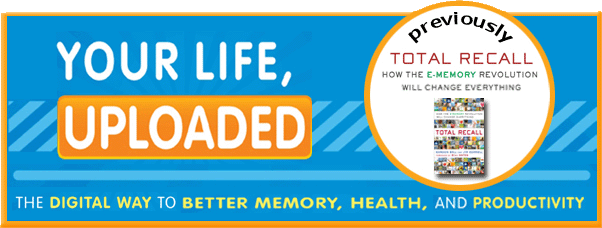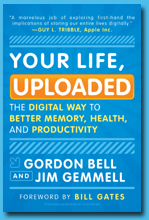YOUR LIFE, UPLOADED
FAQs
You’ll need to read the book to get the full answers to these questions, but here are some brief responses to give you the flavor of our work.
Q: “Total Recall will change everything.” What kind of changes do you expect?
A: The heart of our book (all the middle chapters) is about the impact of Total Recall on life. Total Recall will aid human memory, making accurate recall the norm rather than the exception. It will improve health by making it quantitative and data-driven. It will make us more productive at work, in learning, and in our hobbies. It will enable customized education and change what you aim to keep in your bio-memory. It will provide more enjoyment of our memories and allow us to pass on more to posterity.
Q: Putting your life on the web seems crazy – why would anyone want to do that?
A: We think that putting your life on the web is crazy, too! We are life-loggers not life-bloggers. Logging one’s life into a private, secure e-memory is our ideal. In contrast, we have absolutely no interest in sharing the complete details of our lives with the world in a blog. We want to share a few of our e-memories with some friends and family, and even fewer memories with the world. We believe blogging ought to be extremely selective.
We view our e-memories as an intimate, private extension of our brains. Not that e-memory functions like human memory. It does not. But in terms of privacy and ownership, it deserves similar treatment. Our hope is that society and law will come to recognize it as such. There is attorney-client privilege, and surely your e-memory deserves at least as much privilege.
Q: Why did you start recording everything?
A: See the blog post on this topic.
Q: How much effort does it take to collect and save all your information?
A: Total Recall works best when capture is completely automatic. For example, we automatically make a copy of every web page we visit, with a note of the URL and the time visited. If this was manual, very few web pages would be saved. Similarly, we get pictures from wearing the SenseCam without having to stop enjoying the moment to become the photographer. Today, at the start of the Total Recall revolution, too much is manual. Part of what will change in the next ten years as Total Recall comes to full fruition will be more and more automatic capture. (See our blog, where we post the latest e-memory product offerings)
Q: How much time do you spend organizing and sorting through your e-memories?
A: Very little. With this much information, automatic summarizing, automatic classification, automatic detection of near-duplicates, etc. are critical. Fortunately, plenty of work has already been done to develop such software. Also, we live in time and space, so with accurate time and location recorded (combined with full text search) you can actually find a lot without any manual organization. We will always do some organizing and labeling (e.g. for a project it is worthwhile breaking things down by sub-tasks) but the vast bulk of our material will never be manually organized.
Q: If we digitize all our memory do we have to worry about losing it over time because of evolving technology? I can’t read my old floppy disc anymore. Albums, 8 tracks, Beta, VHS, are obsolete. Wouldn’t paper be a safer way to retain information in the long-term?
A: Picking the right formats and updating our data to new formats will take some care. Data should be stored in formats with an eye to longevity. We believe there will be businesses to fill people’s needs in this space, quite possibly combined with backup services. We discuss this (we call it the “Dear Appy” problem) in the Getting Started chapter. As far as comparing to paper, there are print-formats (e.g. PDF and JPEG) that are so widespread that viewing software will undoubtedly continue to be offered – the market is too enormous to ever be ignored. A PDF on my computer can easily be backed up in a remote location, but it would be a real hassle for me to copy each new piece of paper and send the copies to a storage facility.
Q: Doesn’t Total Recall make you self-absorbed? Do you end up reviewing your past rather than living in the present? No-one has the time to watch their entire life!
A: No, for the same reason that filing cabinets don’t make us self-absorbed and require the time to read every piece of paper in them. We don’t keep files because we intend to review each and every one; we keep them because we may want a few of them in the future and cannot predict which ones they may be. E-memories are so cheap and convenient to create that we can keep a lot of them on the off-chance of a few being useful or enjoyable in the future. We do enjoy e-memories on screen-savers, and there are more memories for us to enjoy, but we don’t find ourselves spending more time on them than we used to spend on our old photo albums and filing cabinets. In fact, if you factor in the time it took to find things in physical papers, the total time has decreased quite a lot.
Q: What devices are important in starting the Total Recall revolution?
A: Cell phones and digital cameras are the main catalysts. A scanner is important if you feel the need to capture lots of legacy documents. But new devices are coming out all the time, like the iPod Nano with pedometer and video recording, the BodyBugg, the Neo sleep coach, and Philip’s line of in-home health monitoring devices. Visit our blog to keep up to date on new devices.
Q: Won’t this make us way too dependent on Computers? Will our memories become flabby?
A: This is an age-old concern about technology. A passage from Plato says this regarding writing:
"for this discovery of yours will create forgetfulness in the learners' souls, because they will not use their memories; they will trust to the external written characters and not remember of themselves”
You probably cannot rattle off your fathers to the tenth generation or sing ballads with stories of your tribe the way your ancestors did. But faced with the trade-off between written knowledge and flexing our memory’s muscles, mankind has voted decisively for literacy; the value proposition was just too compelling. We think the value proposition for e-memories is just as strong.
However, we don’t see memories getting completely flabby. It will not be the case that you don’t memorize, but merely that you memorize different things. You will want to have all kinds of things in your bio-memory for instant access: anything that you want instant recall of, that you want to be able to use in a flowing conversation. On the other hand, anything for which it is sufficient to get after a 5 second search you won’t need to bother memorizing.
Q: How much work does it take to go digital?
A: More and more is being “born digital” making it no work at all. However, digitizing old papers and photos can be a lot of work, and paying a service to do it for you is often the way to go. We give some tips in our Getting Started chapter and in our References and Resources appendix. Going paperless de-clutters your life and makes you more effective, so even though there may be some cost and effort we highly endorse it! Start by using it for current and future documents, and then decide if there’s value in scanning legacy items.
Q: What is MyLifeBits?
A: MyLifeBits is our research project. It was an experiment to record as much of Gordon’s life digitally as possible and an investigation into the software necessary to manage a digital life. See www.mylifebits.com for details. The book is based on much more than just our work. We started the CARPE workshop and funded 14 universities to study this area. The fabulous work of our academic colleagues played a big role in helping us understand Total Recall. Our experience is only a small foretaste of what is coming in the next ten years.
Q: How much information do you delete?
A: Only junk mail and spam. We believe that deleting information from your e-memory is almost always a mistake.
Q: Don’t we need to forget things – isn’t it healthier?
A: Perhaps it is for bio-memories. Electronic memory retention is different than biological memory retention. Bio-memory is plagued with unwanted recall, and hindered by clutter. E-memories can avoid both these pitfalls. See our chapter Living Through the Revolution for a more detailed discussion.
Q: I’ve heard of Jill Price, who has incredible recall but ends up sounding like a tortured soul. Why would I want this?
A: This is a great example of how bio-memory retention may also be accompanied by undesired recall. E-memories don’t have this problem; you can prevent their recall without actually deleting them.
Q: Isn’t recording/remembering everything un-natural?
A: We might ask that of every technology that we employ. Many would say that man is by nature a tool-maker – and the very first stone-age tool makes man “un-natural,” strictly speaking. The wheel, literacy, medicine, surgery, flush-toilets, haircuts, and even clothing could also be scrutinized for being “un-natural.” We think the crucial question is not whether a technology is “natural” but whether its advantages outweigh its disadvantages.
And we’d like to emphasize: we are not telling anyone what they ought to do. We are saying you will have the ability to record your entire life. There are many benefits to increased recording, so we predict there will be vastly more recording done than ever before.
Q: When did you start working on Total Recall?
A: In 1998 Gordon started an effort to scan all his paper. By 2001 this had grown to an effort to digital everything possible, and become a software research project called MyLifeBits.
Q: What about security? Doesn’t this put me at risk of identity theft or having my personal life details stolen?
A: You probably already have everything an identity thief needs on your PC and – even more accessibly – in your recycle bin. It shouldn’t take Total Recall to encourage us to get serious with our computer security; we already need to be diligent today.
Q: Won’t you just drown in clutter, unable to find the important stuff amidst all the mundane trivia?
A: Bio-memories get cluttered and confused by too much material, but e-memories can number-crunch, detect redundancy, summarize, and tuck away the clutter where you never need to see it – until that day you discover you need that critical detail. Already we have credit card bills detailing every purchase and cell phone bills listing each every call. Usually, we can ignore and forget entire bills. But occasionally an individual entry is invaluable. For those of us who have such records in a database, they become even more convenient to make use of and even less likely to clutter up our lives.
Didn’t get your question answered? Read the book, where we answer questions like the following:
- What exactly is stored in your e-memory—that is what kind of data and how many bytes?
- How do you organize your information—that is, what folder and file structure do you use?
- Can you give me some really specific examples of how you have used your e-memory that does something that my bio-memory might not have been able to do?
- What was the inspiration for the MyLifeBits project?
- Who was Vannevar Bush and Memex?
- How do you get your health records?



